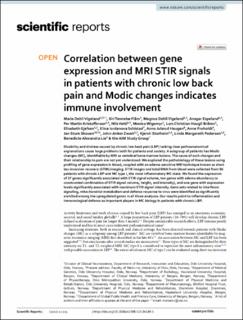Correlation between gene expression and MRI STIR signals in patients with chronic low back pain and Modic changes indicates immune involvement
Vigeland, Maria Dehli; Flåm, Siri Tennebø; Vigeland, Magnus Dehli; Espeland, Ansgar; Kristoffersen, Per Martin; Vetti, Nils; Wigemyr, Monica; Bråten, Lars Christian Haugli; Gjefsen, Elisabeth; Schistad, Ellina Iordanova; Haugen, Anne Julsrud; Johanessen, Anne Froholdt; Skouen, Jan Sture; Zwart, John Anker Henrik; Storheim, Kjersti; Pedersen, Linda Margareth; Lie, Benedicte Alexandra
Journal article, Peer reviewed
Published version

Åpne
Permanent lenke
https://hdl.handle.net/11250/3011771Utgivelsesdato
2022-01-07Metadata
Vis full innførselSamlinger
- Department of Clinical Medicine [2066]
- Registrations from Cristin [9791]
Sammendrag
Disability and distress caused by chronic low back pain (LBP) lacking clear pathoanatomical explanations cause huge problems both for patients and society. A subgroup of patients has Modic changes (MC), identifiable by MRI as vertebral bone marrow lesions. The cause of such changes and their relationship to pain are not yet understood. We explored the pathobiology of these lesions using profiling of gene expression in blood, coupled with an edema-sensitive MRI technique known as short tau inversion recovery (STIR) imaging. STIR images and total RNA from blood were collected from 96 patients with chronic LBP and MC type I, the most inflammatory MC state. We found the expression of 37 genes significantly associated with STIR signal volume, ten genes with edema abundancy (a constructed combination of STIR signal volume, height, and intensity), and one gene with expression levels significantly associated with maximum STIR signal intensity. Gene sets related to interferon signaling, mitochondrial metabolism and defense response to virus were identified as significantly enriched among the upregulated genes in all three analyses. Our results point to inflammation and immunological defense as important players in MC biology in patients with chronic LBP.
